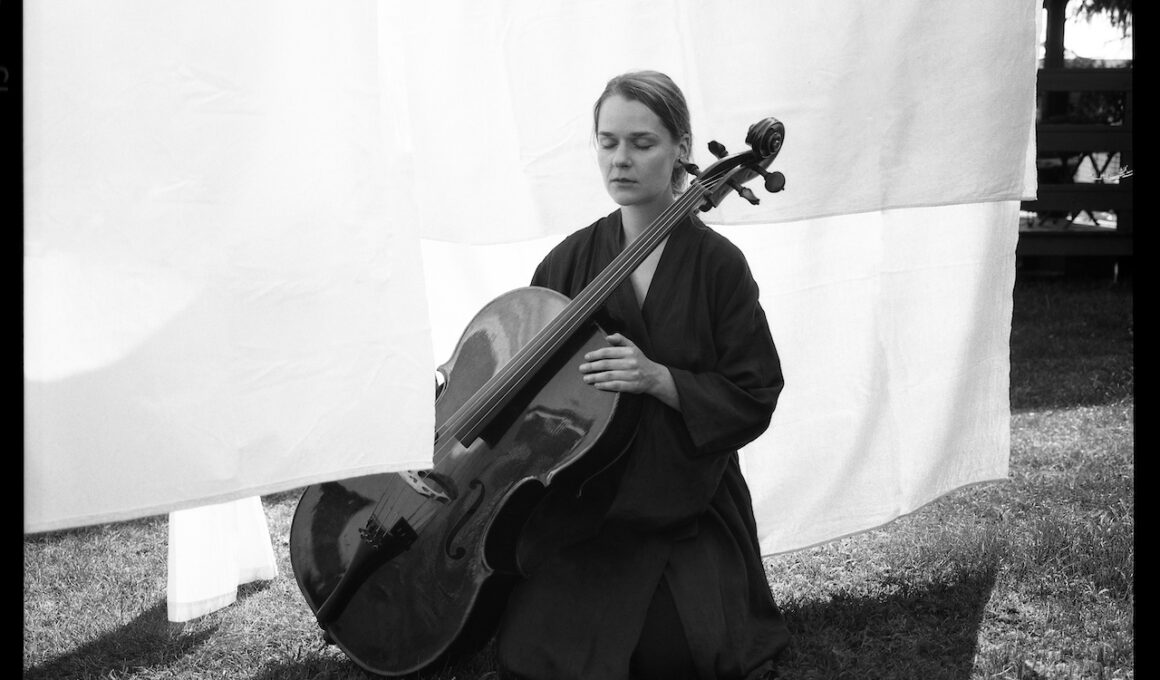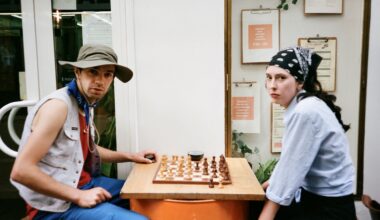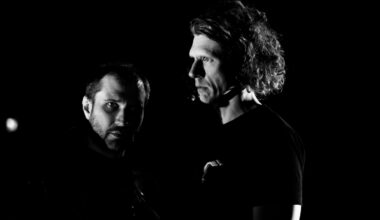Dobrawa Czocher has an outstanding career in classical music with passages at some of Europe’s most respected philharmonics – she’s a member of the Junge Deutsche Philharmonie, principal cellist of the Neue Philharmonie Berlin as well as the soloist at Szczecin Philharmonic. It’s her more recent work as a composer though which has really caught the critics’ ears. She collaborated with her good friend and acclaimed pianist Hania Rani on two albums, the last of which got released by the prestigious Deutsche Grammophon label. In these releases she shows her ability in bringing a really fresh sound to the cello, mixing in contemporary influences with classical structures as well as using innovative recording and production techniques which subtly provoke the listener.
With her maturing into a promising composer, eager to break stuffy boundaries in the genre by incorporating influences from Philip Glass to GoGo Penguin, Dobrawa’s now ready to release her debut album of solo material. For “Dreamscapes”, Dobrawa takes dreams and unconscious states as the starting point to a journey, creating highly evocative and atmospheric pieces that explore the richness of reveries.
FACTS
1. “To send light into the darkness of men’s hearts–such is the duty of the artist.” ― Robert Schumann
2. “Either we have hope within us or we do not. It is a dimension of the soul and is not essentially dependent on some particular observation of the world. HOPE is an orientation of the spirit, an orientation of the heart. It transcends the world that is immediately experienced and is anchored somewhere beyond its horizons. HOPE in this deep and powerful sense is not the same as joy that things are going well or willingness to invest in enterprises that are obviously headed for early success, but rather an ability to work for something because it is good, not because it stands a chance to succeed. HOPE is definitely not the same thing as optimism. It is not the conviction that something will turn out well, but certainty that something makes sense regardless of how it turns out.“ ― Vaclav Havel
QUESTIONS
1. What is the biggest inspiration for your music?
Everything that happens to me can be a source of inspiration if I am curious enough. For instance, other people, talking to them. I was always interested in human nature, humans’ mind. How people live and think. Also their need for spirituality and a connection to something bigger. An extension of this fascination is psychology and this in turn is associated with great books, movies and theater. Then, for sure, nature too – its beauty but also its power and greatness constitute an endless source of inspiration. As a classically trained musician, I must admit that classical music is something that shaped my taste and sensitivity as a musician.
2. How and when did you get into making music?
Not that long ago. For most of my life I concentrated on classical music performance but there was always some kind of need for creation within myself. I was working in an orchestra as a cellist when the pandemic happened and for the very first time in my life there were no plans for future concerts (in which I would perform classical music of course). And only then did I finally find the courage to write my first pieces. At that time, Hania Rani and I composed Inner Symphonies and I wrote my first solo compositions. Some of them are included on my debut album, ‘Dreamscapes’. For example, one of them is ‘Zima’.
3. What are 5 of your favourite albums of all time?
Jean-Guihen Queyras and Alexander Thraud playing Debussy & Poulenc Cello Sonatas, 2. Ian Bostridge & Leif Ove Andsnes performing ‘Winterreise’ by Franz Schubert, 3. Max Richter ‚Vivaldi Recomposed’, 4. Radiohead ‘Kid A’, 5. Sławek Jaskułke ‘Sea’ (although I could easily add 15 more! :)
4. What do you associate with Berlin?
Berlin is a place in which I lived for one year and that was a very formative experience for me, not an easy one, but truly important for my personal and professional paths. Now, it’s associated mostly with my management and labels Deutsche Grammophon and BMG / Modern Recordings but also with a few friends close to me. I like to be back in Berlin experiencing its vast array of restaurants, concert venues, museums and of course I am in love with the Berlin Philharmonic.
5. What’s your favourite place in your town?
Currently, I live in Warsaw, and this is my place to be. After many years of travelling and living in a few other places, I ascertained that when I am back to Warsaw – I am back home. My favorite place in Warsaw is the whole district in which I am living now and where my studio is located. This district is called Saska Kępa and I like its atmosphere – it’s like a little town in a huge city. The tempo of living is slower here, it’s green and I like architecture too. Some famous Polish artists used to live there, for instance Witold Lutosławski, a fantastic composer. Recently I watched an absolutely stunning documentary called “The Balcony Movie” which was shot by director Paweł Łoziński on his balcony. I wasn’t surprised when it turned out his house and balcony are located in Saska Kępa too. It’s a certain spirit that I sense there and simply love. When you watch “The Balcony Movie” I promise you will sense it too.
6. If there was no music in the world, what would you do instead?
First of all, I think a world without music would be so empty! But I guess my second choice would be another form of art. Maybe psychology. Or both at the same time so probably something connected to theater and movies.
7. What was the last record/music you bought?
Radiohead ‚A Moon Shaped Pool’ LP, Jóhan Jóhannson ‚Arrival’ LP, Jonny Greenwood ‚There will be blood’ LP
8. Who would you most like to collaborate with?
Look at point 7 :)
9. What was your best gig (as performer or spectator)?
As spectator: Rotterdam Philharmonic Orchestra playing Stravinsky’s ‚Firebird’ in their concert hall in Rotterdam, Bjork at Open’er Festival 2012, L,Arpeggiata performing at Szczecin Philharmonic (my heart beats stronger even now when I am mentioning these. They were revolutionary experiences changing my perception of what a performance can be). As performer: those concerts when I feel a connection with other musicians on the stage and with the audience. I think one of them was when we performed Inner Symphonies with Hania Rani and our ensemble (Korneli Grądzka, Paweł Czarny) in London at Union Chapel (2021) and when I was performing Dreamscapes at Reeperbahn Festival in Hamburg (2022)
10. How important is technology to your creative process?
I am a classically trained musician so production’s world of production is new for me but I am fascinated by the endless possibilities it offers. I am learning and adding productional solutions increasingly often to my music. For the album Dreamscapes, I asked to work on production with German composer Niklas Paschburg and I am very fond of what we achieved. I needed an endlessly wide sound and atmosphere like from a dream and with a number of effects, Niklas created it perfectly
11. Do you have siblings and how do they feel about your career/art?
Dreamscapes is my debut in which I am presenting my beloved instrument: cello and what, in my opinion, the cello is capable of. I am building music based on layering cello lines and multiplying sound effects (achieved again by the cello) in order to create a world of dreams or thinking deeper – subconsciousness. This mysterious part of each of us is the inspiration for this album. If some listeners find in this musical world part of themselves, I would be the happiest.


